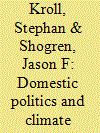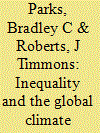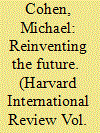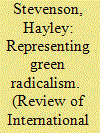|
|
|
Sort Order |
|
|
|
Items / Page
|
|
|
|
|
|
|
| Srl | Item |
| 1 |
ID:
123229


|
|
|
| 2 |
ID:
085418


|
|
|
|
|
| Publication |
2008.
|
| Summary/Abstract |
We use the theory of two-level games to explore how domestic constraints affect the outcome of bargaining games over national contributions to an international public good such as global climate change, and to discuss the implications for the Schelling conjecture. We model the international negotiations on two dimensions-domestic and foreign contributions to the international public good-and extend the basic two-level model by examining a nonzero sum, two-dimensional conflict model on level one that includes characteristics of both conflict and cooperation. Our main results suggest that if the domestic game is a ratification game (as in the presidential system of the US), then contributions do not exceed those in a benchmark game without domestic constraints. But if the domestic game is an election game (which is more important in the parliamentary system of most continental-European countries), contributions can actually be higher than the benchmark.
|
|
|
|
|
|
|
|
|
|
|
|
|
|
|
|
| 3 |
ID:
085440


|
|
|
|
|
| Publication |
2008.
|
| Summary/Abstract |
This article explores the hypothesis that global inequality may be a central impediment to interstate cooperation on climate change policy. Conventional wisdom suggests that outcomes in international environmental politics are primarily attributable to material self-interest, bargaining power, coercion, domestic environmental values, exogenous shocks and crises, the existence of salient policy solutions, the strength of political leadership and the influence of nonstate actors. Yet none of these approaches offers a completely satisfactory explanation for the long-standing north-south divide on climate change. Drawing on social inequality literature and international relations theory, we argue that inequality dampens cooperative efforts by reinforcing 'structuralist' world-views and causal beliefs, polarizing policy preferences, promoting particularistic notions of fairness, generating divergent and unstable expectations about future behaviour, eroding conditions of mutual trust and creating incentives for zero-sum and negative-sum behaviour. In effect, inequality undermines the establishment of mutually acceptable 'rules of the game' which could mitigate these obstacles.
|
|
|
|
|
|
|
|
|
|
|
|
|
|
|
|
| 4 |
ID:
119895


|
|
|
|
|
| Publication |
2012.
|
| Summary/Abstract |
The urbanization of developing countries is transforming global climate, landscapes, societies, and cultures. The strong pull of cities and towns for higher wages and quality of life has emptied rural areas and provided higher incomes, education, health status, longevity, and, for many, liberation from the limitations of rural life.
|
|
|
|
|
|
|
|
|
|
|
|
|
|
|
|
| 5 |
ID:
131702


|
|
|
|
|
| Publication |
2014.
|
| Summary/Abstract |
In recent years, the post-neoliberal bloc of Latin America countries, ALBA, has fashioned a role for itself in international climate change negotiations as representing the voice of 'the people'. In this article I draw on innovative theorising of representation to critically examine this claim. I argue that although ALBA has sought to construct a constituency based on the malleable notion of 'the people', its function is better understood as 'discursive representation', and specifically as representation of Green Radical discourses. Such forms of representation are potentially important in global governance given the challenges of capturing the interests of all affected parties. I critically evaluate this case of discursive representation in terms of its rhetorical efficacy; accountability; consistency; and legitimacy. Although certain favourable elements emerge from this evaluation, this case also points to the hazards of transmitting a public discourse through a state-based representative in multilateral settings
|
|
|
|
|
|
|
|
|
|
|
|
|
|
|
|
|
|
|
|
|